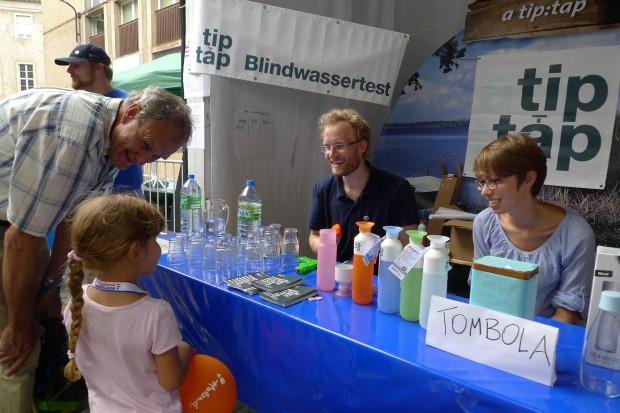Germans stick to their bottled water as tap tries to gain foothold
All-you-can-drink tap water — fizzy or still — was given out at Berlin’s Wasserfest. (Photo by Susan Stone.)
Germany is, on the whole, an environmentally-friendly country. Germans recycle fervently, have an active Green political party, and many favor organic or regionally grown food.
Yet Germans also love their bottled water, which is often pricier than beer.
Supermarkets are flooded with choices — fizzy, still, or mineral enriched, while tap is considered second-best, or even second-rate, though it is good, clean and highly regulated. But some are trying to wean Germans off the bottle and onto the tap.
A group of faucet fans has gathered at the Wasserfest, the water-themed festival run by the Berliner Wasserbetrieb, the German capital’s water company.
At one booth, Samuel Höller is offering up some cool water to the visitors navigating the unusually hot day, which has hit 90 degrees Farenheit. He gives them two unmarked glasses to try. One is French bottled water, the other Berlin tap, or Leitungswasser.
Höller smiles as another drinker votes for Berlin’s best. His European water initiative, called A Tip: Tap, is trying to discourage consumption of bottled water.
Not everyone is on board. Just steps away, Mohammed Nassar pulls a large bottle of mineral water from a tiny backpack, and takes a swig.
He says he knows Berlin’s water is clean and safe, but it’s also boring.
“I just really like sparkling water — that’s my problem,“ he said ruefully. “So I tend to avoid tap water.”
But the Wasserbetrieb is prepared for Germany’s many friends of fizz, and they have also provided cool, free carbonated tap water today. At a picnic table, Claudia Fonn cautiously sips a cup, but doesn’t look convinced. Her family runs on bottled water, and it’s her job to keep them quenched.
“It’s a lot of work, schlepping drinks around for the whole family,” she said. “And then three days later, my kid says ‘ooh, so many empty bottles.’ And I say, ‘yep.’”
Fonn recycles the plastic bottles — glass would be too heavy — so she insists she’s helping the environment, not hurting it. Besides, she needs bottled water on hand for people who visit her home. Fonn says she wouldn’t even serve tap water to a thirsty workman — it would be downright rude.
“I mean, simply turning on the tap, and saying ‘here?’ That’s like giving feed to animals. The poor workman, he’ll never come back,” she said.
As well, she explains, she also needs bottles for her daughter to take to school — there are no water fountains there. In fact, you rarely see any drinking fountains in Germany, not in airports, train stations or libraries.
But A Tip:Tap hopes to change that. It’s spent two years getting a public drinking fountain built on a corner in the Berlin neighborhood of Neukölln — and it’s still struggling to pay the maintenance fees and the costs of removing the fountain so it doesn’t freeze during the city’s harsh winters.
A Tip:Tap’s Lena Ganssmann says she grew up drinking bottled water, but now she asks for tap everywhere. In restaurants and bars, the response is more often a stony stare than a fresh glass — they’re adamant they’ll lose beverage profits.
“It does take me a bit of courage every time,” she said. “But I think that’s the way forward. When there’s a demand for tap water, I think it will sort of solve itself. Because it works in America, it works in France — why not here?”
In Germany, there’s water everywhere, but not enough is drunk — or, in Berlin, used in any way, says Jens Feddern who oversees the city’s water supply.
Berlin’s water system was built to serve a much larger population and industry. Both declined dramatically after German reunification. On top of that, Feddern points out, water usage is dropping each year, partly due to water-saving washing machines, showerheads and dishwashers. And prices have risen.
“In Berlin itself, there is no need to save water,” he insisted.
Because not enough water is being used, Feddern says, the groundwater level is rising in Berlin, and in some areas of the city, cellars stay wet. There’s also not enough water circulating through the system, which means sewage sediments build up, and start to stink, requiring extra cleaning.
“If you want to save something,” Feddern said, ”you should save C02. It’s not necessary to buy water in bottles, put it in a car, drive it home, then climb up the stairway with 20 kilos of water. This makes no sense because we deliver it for a fee, directly to your tap.”
In the end, Feddern says, tap water needs an image overhaul.
“This Leitung, this pipe, this tap. This water work — these technical things we talk about. Manufactures of mineral water, they never talk about their technic,” he mused. “They talk about their nice bottle, they talk about behavior, how you can use the water in order to feel well. Therefore we have to learn a little bit to go in this direction.”
Feddern’s Berliner Wasserbetrieb is currently part private, but may soon revert wholly to public hands. This spring, the upper house of the German parliament voted against a European Union plan to allow privatization in this sector, holding the view that water should belong to the people — whether they want to use it, or not.
We want to hear your feedback so we can keep improving our website, theworld.org. Please fill out this quick survey and let us know your thoughts (your answers will be anonymous). Thanks for your time!
